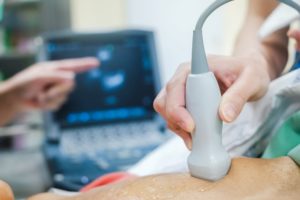What does an ultrasound check for?
Many of us think of X-rays as the go-to for diagnostic imaging. While they accurately detect a lot of issues like a broken bone, sometimes you need to take a different route.
Also known as a sonogram, an ultrasound provides valuable information that can diagnose, treat, and monitor a variety of health concerns.
Let’s start with a brief history of the ultrasound.
Ultrasounds were first used during and following WWII.
The first published works on medical ultrasounds came from Dr. Karl Theodore Dussik in 1942.
Then, in the mid-1950s Professor Ian Donald and his colleagues in Glasgow conducted additional pioneering research that contributed to the wide use of this technology.
Additional efforts around the world from researchers, medical professionals, and scientists contributed to the ultrasounds we use today.
What exactly is an ultrasound?
This form of imaging uses sound waves, as opposed to radiation, to form images of the inside of your body.
A device called a transducer is placed over or inside a part of your body. The transducer converts electrical current into sound waves that are sent into the body and then bounce off of your internal organs. The transducer then picks up these rebounding sound waves and produces a picture of the internal organs on a computer screen.
Most commonly, ultrasounds are associated with tracking the growth and development of an unborn baby, as well as monitoring the health of a woman’s uterus, ovaries, and placenta.
Beyond that, ultrasounds benefit way more than expectant mothers. In addition to being used before, during, and after pregnancy, ultrasounds are used to diagnose a number of other health concerns.
Let’s explore some of the other conditions an ultrasound in New Jersey can be used for!
- Abnormal growths including tumors
- Blood clots
- Gallstones
- Gallbladder disease
- Kidney or bladder stones
Thyroid issues - Rectal concerns
- Joint inflammation
- Metabolic bone disease
- Lumps in the breast
Furthermore, ultrasounds do not only diagnose, but they can also be used for guidance in treatment.
Specifically, procedures that involve needle placement to sample fluids or tissue from tendons, joints, muscles, cysts, organs, or other areas make use of ultrasound to achieve precision.
Turn to ImageCare Radiology for safe and efficient ultrasounds in New Jersey! Explore our website to learn more about our approach to quality care.